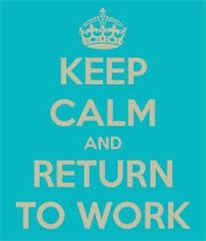People leave the workplace under all kinds of circumstances, whether voluntary or not. Lay-offs, sicknesses, and motherhood are the most common reasons for taking time off from work. With the poor state of today’s economy, unemployment rates are surfacing at an all time high. Because the workplace changes over the years, being out of work for a while can mean a need for updated wardrobes, resumes, interviewing skills, and knowledge of what employers are looking for. Many of these issues evolve over time and by keeping up with the trends, candidates will successfully convey their interest in getting the job.The majority of people facing unemployment or getting back to work for the first time in months or even years are generally the population that were laid-off during the recession.
Diana Middleton of The Wall Street Journal states how “Starting any new job is hard, and coming back to work after a long layoff can be even harder. You have to re-establish a routine, refresh your skills and rebuild your confidence.” Keeping up with the current trends is imperative in making a successful comeback. Get back into the swing of things. Going back to work for the first time in months and in many cases, even years, can be an extremely intimidating and nerve-racking experience. This is especially true for the many people who got laid-off from their previous jobs and experienced months of unemployment. Returning to the workplace is, although an exciting time, very stressful for people who have gotten out of the “working routine.”
As Michael Luo of The New York Times suggests, “Interviews with more than a dozen people who were out of work at least a half-year during the recession and have now landed jobs found many adjusting to new realities. They include grappling with new found insecurities and scaled-back budgets; reshaped priorities and broken relationships. In some ways, it is equivalent to the lingering symptoms of post-traumatic stress.”In general, interviewing is only half the battle when making a return to the workplace.
Dealing with the implications of unemployment for months or years is one of the most difficult obstacles, especially mentally, when finally returning to work. People’s anxieties are extremely high when they face this type of a comeback. By making a routine of exercising, eating, and sleeping, newly employed people can get back on their feet both physically and mentally, which will lead to a better workplace performance. A successful transition. Being the “new person” in the office can be a stressful time. It is best to connect with people quickly in order to learn as much about the company as possible. This way, the transition from the unemployed world to the working one can be as rapid and worry-free as possible. This will reduce the stress and anxiety that may accompany starting a new job.
Overall, the key to getting back to work and feeling comfortable with this transition comes from establishing a routine and rebuilding poise. With this confidence, new employees will flourish.Reaction Search International is a leading executive search firm specializing in the placement of sales and marketing professionals throughout various industries within the United States and abroad.Article
Source: http://EzineArticles.com/?expert=Robert_Boroff
_______________________________________________
To get more tips on the subject matter, Join us on Tuesday, November 18, 2014 at 2:00 p.m. for a workshop on Interview Readiness. You will learn techniques to make sure the interviewer can see your true personality and how you would be a great fit for their organization.
Click here to register!




